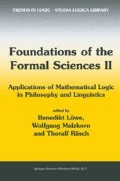Abstract
The concept of rational decision sometimes leads to paradoxical conclusions. The Surprise Exam, the Prisoner’s Dilemma, Newcomb’s Problem, The Centipede, are some of the well-known examples. Game theorists have debated these problems for almost fifty years with a variety of diagnoses and/or resolutions offered. The main obstacle to a satisfactory solution has been the essential ingredient of such games or decision situations: the interdependence of the decisions. This was noted very early on by the economist Carl Kaysen in his review [Kay146–47] of von Neumann and Morgenstern’s Theory of Games and Economic Behavior.
Access this chapter
Tax calculation will be finalised at checkout
Purchases are for personal use only
Preview
Unable to display preview. Download preview PDF.
References
“What von Neumann and Morgenstern proceed to do, however, and what other theorists have done ever since, is build a theory based on denying, in the end, that the behavior of each other rational player cannot be parametrized. In effect, what they do is reduce the problem for each participant to that of a standard maximization problem.” [McC90, p. 258]
The game-theoretic literature is large and there have been far too many responses to be adequately addressed in this limited space. However, the types of approaches that operate by imposing restrictions that I do mention, i.e., the approaches summarized by Aumann (refinements of the equilibrium concept) and the type exemplified by Bicchieri (weakening idealizations) cover a significant portion of the traditional responses.
“The interesting aspect of these refinements is that they use irrationality to arrive at a strong form of rationality. In one way or another, all of them work by assuming that irrationality cannot be ruled out, that the players ascribe irrationality to each other with small probability. True rationality requires ‘noise’; it cannot grow in sterile ground, it cannot feed on itself only.” [Aum87, p. 42]
“I argue that common knowledge of rationality is too strong an assumption [...] An important consequence of weakening the common knowledge assumption is that out-of-equilibrium behavior becomes compatible with player’s rationality [...] [if we assume incomplete knowledge] then the assumption that players can make mistakes is unnecessary.” [Bic93, p. 136].
Regarding perfect rationality this point has been made by Hillas and Kohlberg: “if [...] it is possible to analyze sensibly games in which there are no possibilities of mistakes, then such an analysis is, in theory, more general. One can apply the analysis to a game in which all probabilities of error (or irrationality) are explicitly given” [Hil0Koh∞, p. 36]. I suggest that the same point applies to the restriction of common knowledge.
The same goes, I claim, for the solutions based on restricting idealizations addressed here. I do not claim that only the revision approach avoids this problem. There may be other approaches that provide satisfactory answers. However, the restrictive approaches do currently seem to be dominating the field to a point that makes my claim reasonably strong even without going into the other approaches.
Author information
Authors and Affiliations
Editor information
Editors and Affiliations
Rights and permissions
Copyright information
© 2003 Springer Science+Business Media Dordrecht
About this chapter
Cite this chapter
Chapuis, A. (2003). An Application of Circular Definitions: Rational Decision. In: Löwe, B., Malzkom, W., Räsch, T. (eds) Foundations of the Formal Sciences II. Trends in Logic, vol 17. Springer, Dordrecht. https://doi.org/10.1007/978-94-017-0395-6_4
Download citation
DOI: https://doi.org/10.1007/978-94-017-0395-6_4
Publisher Name: Springer, Dordrecht
Print ISBN: 978-90-481-6233-8
Online ISBN: 978-94-017-0395-6
eBook Packages: Springer Book Archive

